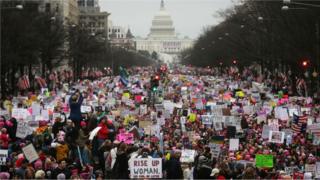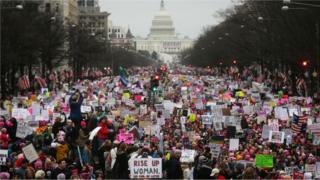US National Archives sorry for blurring Trump signs
The US agency says it was wrong to blur out signs critical of the president at the 2017 Women’s March. …

 Image copyright Getty Images
Image copyright Getty Images The US National Archives has apologised for altering a photo of the 2017 Women’s March, including blurring signs critical of President Donald Trump.
The agency, which describes itself as the country’s record keeper, said it “made a mistake”.
Changes to the photo, first reported by The Washington Post, included removing the president’s name from a sign that read “God Hates Trump”.
The National Archives said it had removed the altered image.
In a statement shared on social media, the agency said it had “always been completely committed to preserving our archival holdings, without alteration.”
“This photo is not an archival record held by the National Archives, but one we licensed to use as a promotional graphic. Nonetheless, we were wrong to alter the image,” it said.
It added that the photo would be replaced “as soon as possible” with the unaltered image, and pledged to “immediately start a thorough review of our exhibit policies and procedures so that this does not happen again.”
The apology came as crowds gathered across the US on Saturday for the fourth annual women’s march.
How did we get here?
The photo, taken by Getty Images photographer Mario Tama, shows a huge crowd of people gathering in Washington for the 2017 Women’s March, which took place the day after Mr Trump’s inauguration.
Many of those taking part are seen holding protest signs, some with references to the US president.
While using the image as a “promotional graphic” for an exhibit on the 19th Amendment, The Washington Post reported that the National Archives had blurred signs critical of Mr Trump and those that referenced women’s anatomy.
Alterations included removing the president’s name from a sign that read “Trump & GOP — Hands Off Women”, and blurring out the word “vagina”, the newspaper reported.
In a statement to the Washington Post, spokeswoman Miriam Kleiman said the National Archives, as a “non-partisan, non-political federal agency”, had blurred the president’s name “so as not to engage in current political controversy”.
The decision to blur references to women’s genitals was made because the words could be perceived as inappropriate to students and young people visiting the museum, it said.
The American Civil Liberties Union hit out at the move to alter the image, saying: “The government can’t airbrush history or erase women’s bodies from it. It is the job of the National Archives to document history, not alter it to serve the president’s ego.”




